- Blog
- Product Discovery
- 13 min read
Product Search Engine – Increase Revenue & Customer Satisfaction
Published
8 February 2024Updated
4 December 2025

Key Takeaways
- Product search engines enable users to quickly find a wide range of products, saving time and effort in the search process.
- An efficient product search engine enables a seamless browsing experience by allowing users to filter and sort results based on their preferences.
- Search engines for products can decrease bounce rates by enabling users to find relevant products quickly.
- Experro DXP offers AI-powered product search engine with NLP, personalization, and smart autocomplete that enhances user experience.
Consider this scenario: a user lands on your website, eager to explore your products. He types his desired product in the search bar, only to be met with irrelevant results.
Now think twice and tell if he will invest more time in a frustrating search? Chances are, he won't...
The only solution to this problem is – a better product search engine.
In the eCommerce industry, enhancing customer experience goes beyond eye-catching product displays and captivating landing pages.
It's about constructing a seamless, immersive journey for every visitor, ensuring they effortlessly discover their desired products.
A product search engine allows shoppers to find what they are looking for quickly. This not only allows online store owners to provide the best shopping experience but also improves brand recognition.
In this blog, we will throw light on the importance of product search engines and how they can benefit eCommerce brands.
We will also dive into the KPIs to analyze the effectiveness of an eCommerce product discovery platform.
What is a Product Search Engine?
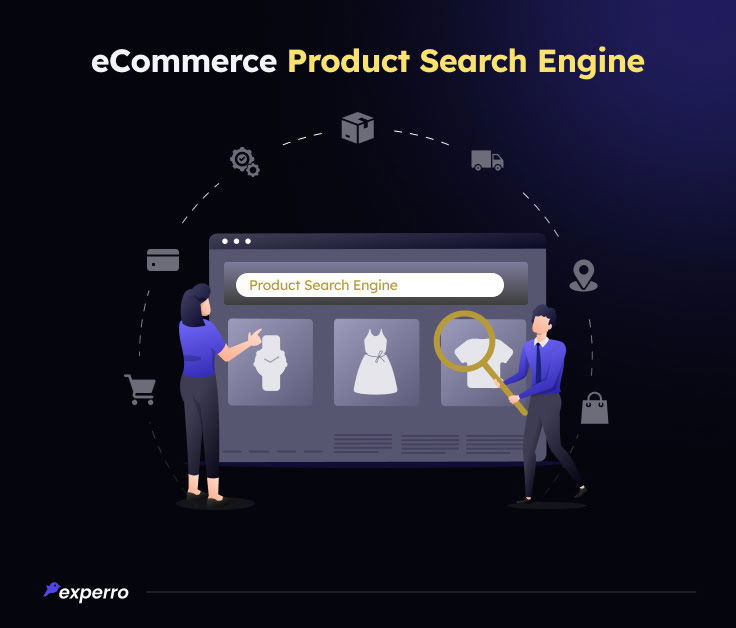
A product search engine is a search bar of a particular eCommerce website/e-store that allows users to find specific products they are looking for.
Product taxonomy also plays a role in easing out the product finding journey for customers online.
It allows users to enter search queries related to products, such as specific item names, categories, or features.
Product Search Engine Example
A better product search engine can have a positive impact on a business; on the other hand, a poor search engine for products can have detrimental effects.
Let's understand it with two examples:
- Example of a good product search engine – provides fast and accurate search results
When you search for a specific product on Amazon, the search engine quickly retrieves relevant results with high accuracy.
For example, if you search for ‘Apple iPhone 15 Pro’, you will see a list of iPhone 15 Pro models with different configurations and sellers.
The result? – happy customers, exploring more related products on the website.
- Example of a poor product search engine – provides slow and inaccurate results
In a poor search engine for shopping, you might experience slow response times when browsing product categories and the search results may not be very accurate.
For instance, if you search for "Apple iPhone 15 Pro," you might get unrelated products or items from various categories.
The result? – A frustrated customer ends up leaving the website!
Why Do Product Search Engine Matter for eCommerce Businesses?

The following points highlight the importance of product search engine for eCommerce websites:
1. Improved User Experience
Did you know? 88% of users are less likely to return to the website after a bad user experience. An ideal search engine can provide faster and more accurate search results, reducing the time customers spend looking for products.
Product search engine's suggestions can help online shoppers find products more quickly, even if they make typing errors or use different synonyms.
When they get relevant product search results without wasting time, it eventually improves the eCommerce customer experience.
2. Higher Conversion Rates
Better search results can significantly boost conversion rates. It provides accurate and relevant information, reducing the chances of users encountering irrelevant products.
Additionally, it reduces the time spent searching for the products and increases the engagement rate.
Moreover, with better product search results, users can quickly refine their search with filters such as price range, size, color, brand, etc.
This reduces friction in customer journeys and ultimately allows businesses to increase conversion rates.
3. Cross-Selling & Up-Selling Opportunities
An effective product search engine can significantly enhance cross-selling and up-selling opportunities.
By displaying relevant or complementary products alongside the search results, users can discover additional items they may be interested in purchasing.
The search result page can include sections showcasing featured or best-selling products. This is how it can gradually drag users' attention to the item that may be of interest to them.
4. Reduced Bounce Rates
A high bounce rate suggests that users are not satisfied with the search results they're getting. And surprisingly eCommerce sites have a 47% of average bounce rate.
However, with a precise search engine for products, customers can have a seamless shopping experience.
Customers are more likely to stay engaged on the website due to accurate search results. As a result, better search experiences reduce bounce rates.
6 Must-Have Features for Product Shopping Search Engine!
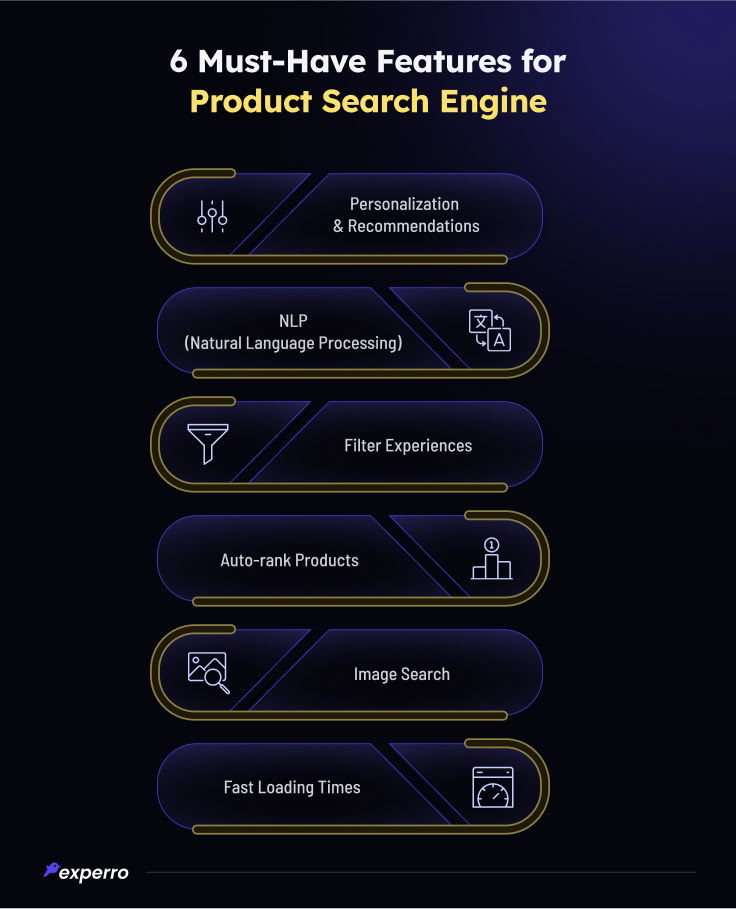
The must-have features for product search engines in detail are as follows:
1. Personalization & Recommendations
Did you know 60% of consumers say they’ll become repeat customers after a personalized shopping experience?
Remember, every interaction with your user gives you a hint of their product interest. The best way to utilize this is to make recommendations while they search for related products.
How does personalization work in product search engines?
When users see products that align with their interests and preferences through effective product clustering, they are more likely to engage with the website.
This can lead to increased time spent on the site, more product views, and higher interaction rates.
For instance, based on customer history, the software identifies that X customer prefers digital watches over analogs.
Whenever they search for watches, the search engine suggests digital watches.
2. NLP (Natural Language Processing)
In the context of product search engines, NLP is used to understand and process user queries in natural language.
This means that the search engine for products can comprehend more complex search queries beyond simple keywords.
Moreover, NLP enables the conversational search engine to understand user queries in a way that mirrors human comprehension, leading to more precise search results.
For example, it can understand synonyms, and even intent, allowing for more accurate and relevant search results.
3. Filter Experiences
Search engines for shopping help users filter through a large number of results to find products that meet their specific requirements.
When customers can explore products with eCommerce filters that cater to their needs, they tend to spend more time on the website, leading to increased engagement and potentially more sales.
For example, if a user is looking for a red dress within a certain price range, they can apply filters to see only relevant options.
4. Auto-Rank Products
In a product search engine, auto-ranking ensures that the most relevant and popular products are displayed prominently in the search results.
This helps users quickly identify products that are likely to meet their needs.
It considers factors such as a customer's purchase history, ratings, and ongoing trends. This ensures suitable and in-demand products are displayed at the top of the search results page.
For example, a user searches for "winter jackets". The auto-ranking feature will show currently trending ''winter jackets'' on the top of the search bar UI.
5. Image Search
Through image search functionality, users can easily find the exact products just by uploading a picture of it. It enables shoppers to discover products that match their preferences.
It can also provide recommendations based on the image uploaded which enables cross-selling and upselling opportunities.
6. Fast Loading Times
According to a recent study of Google page load times, 1-3 seconds of web page load time increases bounce rate probability by 32%.
Fast loading times for search results are an important factor.
Even after having exceptional products on the website, if the search results are not loading fast users may become frustrated and abandon their search.
All-in-one—Search & Agentic Experiences!
Experro does what Algolia doesn’t. See Experro vs. Algolia!
KPIs to Measure the Effectiveness of Product Search Results
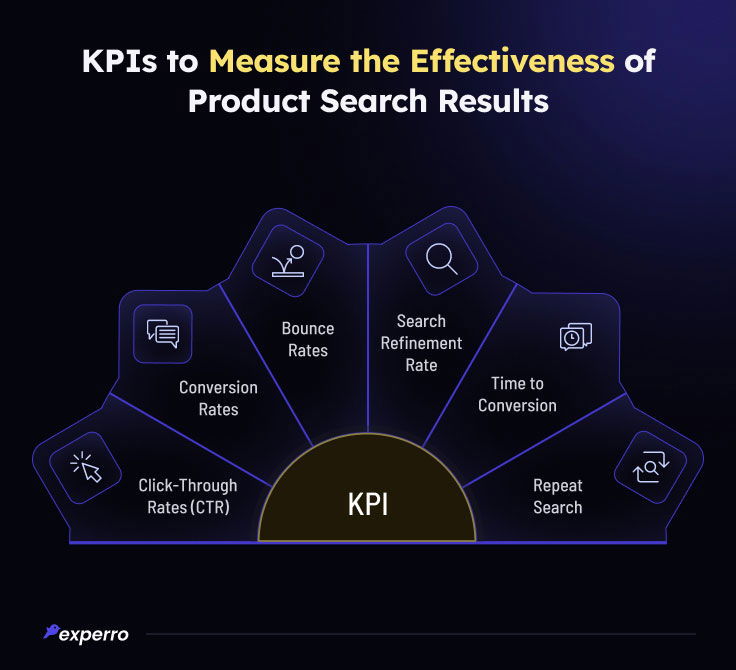
The following are the KPIs to measure the effectiveness of the product search results.
1. Click-Through Rates (CTR)
Click-Through Rate (CTR) is the percentage of users who click on a specific link or product listing after encountering it in search results.
It measures the impact of product listings in attracting user attention.
If a search engine for products is showing the right product quickly then the click-through rates are likely to increase.
A high CTR indicates that the products listed are relevant and appealing to users. It suggests that the search results are effectively capturing user interest.
How to analyze:
CTR = (Number of Impressions ÷ Number of Clicks) × 100%
2. Conversion Rates
Conversion rate is the percentage of users who complete a desired action after visiting a product page. This action could be making a purchase, adding an item to the cart, or signing up for a newsletter.
A high conversion rate indicates that users are finding the product details, pricing, and overall online shopping experience satisfactory.
It measures the impact of the product page in convincing visitors to take the desired action.
How to analyze:
Conversion Rate = (Number of Visitors ÷ Number of Conversions) × 100%
3. Bounce Rates
Bounce rate is the percentage of users who leave the website or a particular webpage after visiting. In the context of product search, this could be the search results page.
A high bounce rate indicates that users are not finding what they are looking for.
It suggests a potential issue with the relevance of search results or the user experience.
How to analyze:
Bounce Rate = (Total Number of Visits ÷ Total Number of Single Page Visits) × 100%
4. Search Refinement Rate
The search refinement rate measures the frequency with which users refine their initial search query to obtain more specific or relevant results.
A high refinement rate might indicate that the initial search results were not satisfactory, prompting users to modify their queries. It can signal areas for improvement in search relevance.
How to analyze:
SRR = (Total Number of Searches ÷ Number of Refined Searches) × 100%
5. Time to Conversion
Time to Conversion measures the average duration it takes for a user to go from the initial interaction with a product to completing a conversion (e.g., making a purchase).
A shorter time to conversion indicates a more efficient and user-friendly shopping experience. It can be an indicator of the effectiveness of product information, checkout process, and overall user interface.
Calculate the time to conversion by taking an average of the durations across all successful conversions.
6. Repeat Search
Repeat Search refers to the frequency with which users perform a new search after their initial search query did not yield satisfactory results.
A high repeat search rate suggests that users are not finding what they want initially, leading to additional searches. This indicates potential issues with initial search relevance and user experience.
Note! - The B2B eCommerce KPIs differ from the B2C customer experience KPIs drastically.
To summarize these customer experience KPIs, we must note that analyzing them collectively provides insights into accuracy of a product search engine.
Best eCommerce Product Search Engines
Do you agree that enhancing user's search experiences is important in the eCommerce landscape!
To provide customers with the most accurate search results, you need to find the best product search tools, including those that support multimodal search.
That is why we have curated a list of the best product search engines for eCommerce.
1. Experro
Experro is a digital experience platform that provides exceptional AI-driven product search enrichment helping businesses to drive revenue.
Let's understand how AI-based search functionality offered by Experro works from the following aspects:
- AI-Powered Search

Experro uses advanced eCommerce search algorithms and machine learning to understand user intent better.
This leads to more accurate and relevant search results, helping users find the products they're looking for quickly and easily.
- Smart Autocomplete

By predicting and suggesting search queries as users type, Experro helps users formulate their search terms more effectively using fuzzy search technology.
The smart auto-complete feature, powered by predictive search, reduces the likelihood of users entering vague or ambiguous search terms, leading to more accurate results and ultimately driving more conversions.
- Personalization & Recommendation
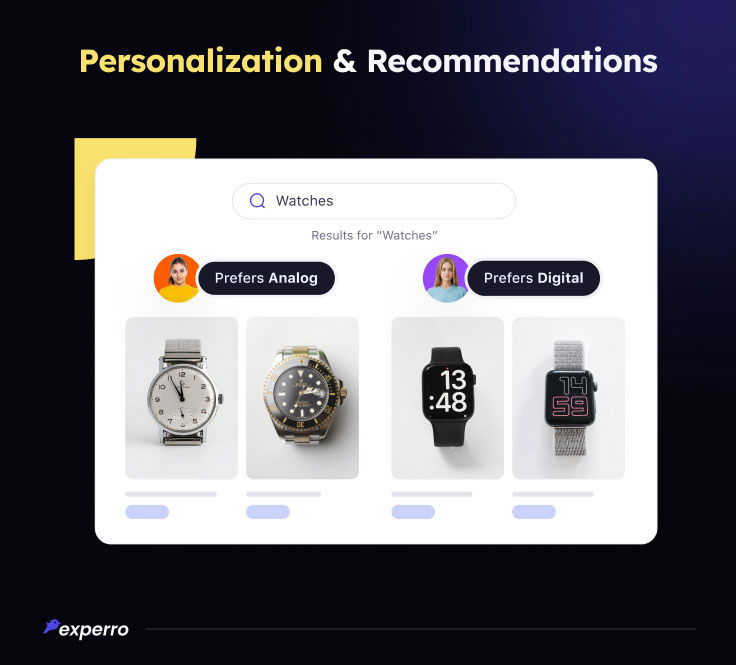
Experro tailors user experiences based on their purchase history and demographic information. This ensures that users are presented with products that are highly likely to match their interests.
- NLP (Natural Language Processing):
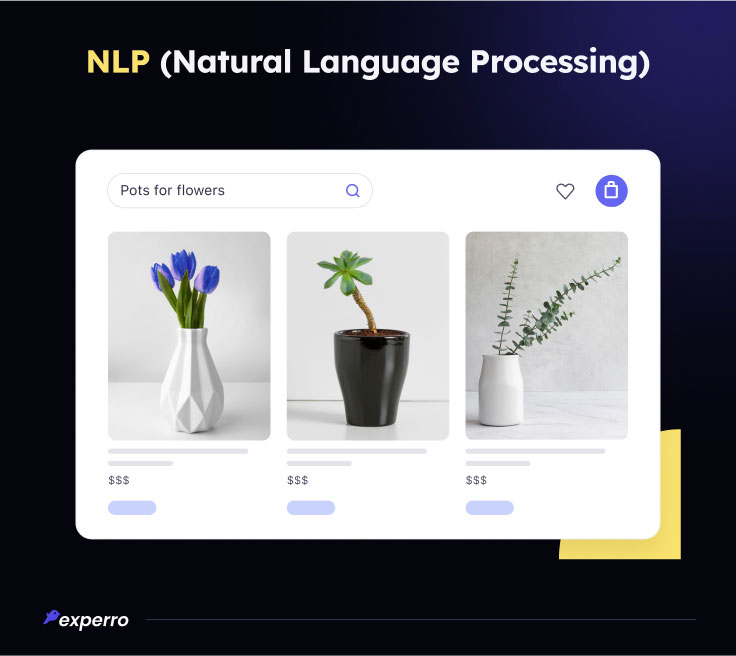
This technology allows the system to understand and interpret user queries in a more human-like manner.
NLP helps in delivering more precise search results, reducing frustration and increasing the chances of users finding and purchasing products.
Try Experro’s AI-Powered Search Engine & Increase Revenue
2. Bloomreach
Bloomreach offers the best product search engine that drives revenue by delivering the most relevant results as per your shoppers' intent.
Bloomreach Search is built to interpret a variety of complex natural language queries/expressions and find product results as per the shopper's product search intent.
3. Doofinder
Doofinder is also one of the best search engines for shopping, designed primarily for eCommerce websites and online stores.
It is a tool that enhances the search functionality of eCommerce product discovery, making it easier for customers to find the products they are looking for.
Doofinder offers search autocompletion, which suggests product names or keywords as users begin typing in the search bar. This feature helps users find products more efficiently.
4. Searchspring
Searchspring is also one of the best product discovery platforms.
It is designed to improve the overall shopping experience for customers by making it easier for them to find and purchase products.
Their solutions often include features like advanced search capabilities, intelligent product recommendations, and tools for optimizing product listings.
Want to provide EXACTLY what customers are searching for & drive revenue?
Conclusion
In conclusion, the significance of a robust product search engine in eCommerce cannot be overlooked.
It enhances user experience, enabling customers to find and compare products and purchase desired items swiftly.
A well-optimized online store search engine enhances customer satisfaction, reduces bounce rates, and ultimately drives higher conversion rates.
Moreover, it empowers online merchants to gain valuable insights from user search behavior, facilitating targeted marketing efforts and personalized recommendations.
Book a demo with Experro to enable search results that drive revenue!
FAQs
What is the product discovery process in eCommerce?
The product discovery process in eCommerce refers to connecting users with the products they need through personalized recommendations.
What is the difference between product search vs product discovery in eCommerce?
Product search refers to showing results of the exact specific items users are searching for. On the other hand, product discovery involves creating personalized shopping experiences by suggesting new items.
- Product search example – when a user searches for ''white sneakers'' it only shows the exact match of search query.
- Product discovery example – when a user searches for ''white sneakers'' it shows recommendations of white sneakers from top brands, trending white sneakers etc.
Why is an accurate product search engine important for eCommerce websites?
A product search engine shows relevant and accurate products to customers based on their search queries. It ultimately creates a positive customer experience and generates more conversions.
What is an AI-powered product search engine?
An AI-powered product search engine uses advanced algorithms to understand user preferences. It includes personalized recommendations on the basis of user's past purchase and preferences.
Additionally, it involves an auto-complete element to complete user's search query and provide quick results.
How does an ideal product search engine enhance customer satisfaction?
An ideal product search engine enhances customer satisfaction by providing accurate results and recommendations. It provides a user-friendly experience to customers which ultimately enhances satisfaction.
What's Inside
- What is a Product Search Engine?
- Why Do Product Search Engine Matter for eCommerce Businesses?
- 6 Must-Have Features for Product Shopping Search Engine!
- KPIs to Measure the Effectiveness of Product Search Results
- Best eCommerce Product Search Engines
- Conclusion
Subscribe to Our Newsletters
Get the latest insights delivered straight to your inbox.